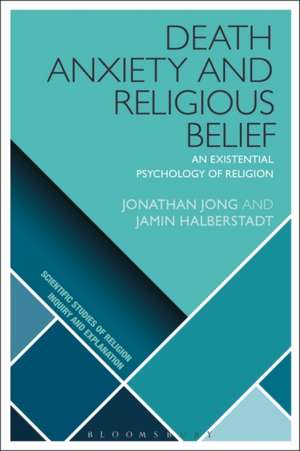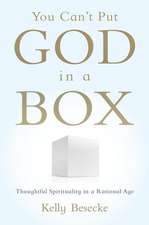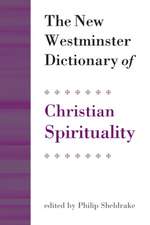Death Anxiety and Religious Belief: An Existential Psychology of Religion: Scientific Studies of Religion: Inquiry and Explanation
Autor Jonathan Jong, Jamin Halberstadten Limba Engleză Paperback – 21 feb 2018
| Toate formatele și edițiile | Preț | Express |
|---|---|---|
| Paperback (1) | 237.57 lei 43-57 zile | |
| Bloomsbury Publishing – 21 feb 2018 | 237.57 lei 43-57 zile | |
| Hardback (1) | 773.88 lei 43-57 zile | |
| Bloomsbury Publishing – 24 aug 2016 | 773.88 lei 43-57 zile |
Din seria Scientific Studies of Religion: Inquiry and Explanation
- 22%
 Preț: 149.02 lei
Preț: 149.02 lei - 23%
 Preț: 192.55 lei
Preț: 192.55 lei - 30%
 Preț: 511.64 lei
Preț: 511.64 lei - 23%
 Preț: 191.75 lei
Preț: 191.75 lei - 21%
 Preț: 218.65 lei
Preț: 218.65 lei - 21%
 Preț: 218.09 lei
Preț: 218.09 lei - 23%
 Preț: 229.41 lei
Preț: 229.41 lei - 13%
 Preț: 194.06 lei
Preț: 194.06 lei - 24%
 Preț: 190.16 lei
Preț: 190.16 lei - 21%
 Preț: 217.91 lei
Preț: 217.91 lei - 24%
 Preț: 190.06 lei
Preț: 190.06 lei - 22%
 Preț: 231.63 lei
Preț: 231.63 lei - 24%
 Preț: 190.06 lei
Preț: 190.06 lei - 23%
 Preț: 191.67 lei
Preț: 191.67 lei - 23%
 Preț: 191.38 lei
Preț: 191.38 lei - 22%
 Preț: 238.11 lei
Preț: 238.11 lei - 30%
 Preț: 596.81 lei
Preț: 596.81 lei - 22%
 Preț: 225.12 lei
Preț: 225.12 lei - 21%
 Preț: 217.82 lei
Preț: 217.82 lei - 22%
 Preț: 237.93 lei
Preț: 237.93 lei - 22%
 Preț: 256.20 lei
Preț: 256.20 lei - 23%
 Preț: 191.38 lei
Preț: 191.38 lei - 23%
 Preț: 255.66 lei
Preț: 255.66 lei - 30%
 Preț: 512.37 lei
Preț: 512.37 lei - 13%
 Preț: 257.03 lei
Preț: 257.03 lei - 30%
 Preț: 511.07 lei
Preț: 511.07 lei - 30%
 Preț: 717.79 lei
Preț: 717.79 lei
Preț: 237.57 lei
Preț vechi: 272.69 lei
-13% Nou
Puncte Express: 356
Preț estimativ în valută:
45.46€ • 47.58$ • 37.84£
45.46€ • 47.58$ • 37.84£
Carte tipărită la comandă
Livrare economică 31 martie-14 aprilie
Preluare comenzi: 021 569.72.76
Specificații
ISBN-13: 9781350061606
ISBN-10: 1350061603
Pagini: 192
Dimensiuni: 156 x 234 x 21 mm
Greutate: 0.35 kg
Ediția:NIPPOD
Editura: Bloomsbury Publishing
Colecția Bloomsbury Academic
Seria Scientific Studies of Religion: Inquiry and Explanation
Locul publicării:London, United Kingdom
ISBN-10: 1350061603
Pagini: 192
Dimensiuni: 156 x 234 x 21 mm
Greutate: 0.35 kg
Ediția:NIPPOD
Editura: Bloomsbury Publishing
Colecția Bloomsbury Academic
Seria Scientific Studies of Religion: Inquiry and Explanation
Locul publicării:London, United Kingdom
Caracteristici
Fills a clear gap in scholarship and the market for a book which provides both the historical context and empirical research in relation to a common assumption
Notă biografică
Jonathan Jong is Deputy Director of the Belief, Brain and Behaviour research group at the Centre for Research in Psychology, Behaviour and Achievement, Coventry University, UK; and Research Coordinator at the Institute of Cognitive and Evolutionary Anthropology, University of Oxford, UK.Jamin Halberstadt is a Professor of Social Psychology at the University of Otago, New Zealand.
Cuprins
List of Tables and FiguresPrefaceAcknowledgments1. The whats and whys of religious belief2. A history of thanatocentric theories of religion3. Measuring faith and fear4. Are people afraid of death?5. The religious correlates of death anxiety6. Death anxiety and religion: Causes and consequences7. The future of immortality, literal and symbolicReferencesIndex
Recenzii
As a call to arms to newer researchers in [death, anxiety, and religious belief], Jong and Halberstadt have done a great service to the field. Their pithy and highly readable text may well inspire the next generation of researchers.
[An] ambitious and scholarly study.
Scholars of religion and those interested in the psychology of religion will welcome this thorough, scientifically grounded contribution to the literature on psychology of religion and religion theory. Summing Up: Highly recommended. Graduate students, researchers, faculty.
An extraordinarily thorough interdisciplinary integration and synthesis of theory and research on death anxiety and religious belief, including the authors' cutting-edge contributions to the field, thoughtfully and gracefully written. Bravo.
Thorough and accessible, this book offers a comprehensive overview of the psychological literature on religion and death anxiety. The authors clearly describe leading theories in the context of historical debates, systematically review available evidence, and boldly present novel findings that convincingly overturn received wisdoms. This beautifully written and organised book will appeal to a general human science audience, and should become a standard part of training in the scientific study of religion.
[An] ambitious and scholarly study.
Scholars of religion and those interested in the psychology of religion will welcome this thorough, scientifically grounded contribution to the literature on psychology of religion and religion theory. Summing Up: Highly recommended. Graduate students, researchers, faculty.
An extraordinarily thorough interdisciplinary integration and synthesis of theory and research on death anxiety and religious belief, including the authors' cutting-edge contributions to the field, thoughtfully and gracefully written. Bravo.
Thorough and accessible, this book offers a comprehensive overview of the psychological literature on religion and death anxiety. The authors clearly describe leading theories in the context of historical debates, systematically review available evidence, and boldly present novel findings that convincingly overturn received wisdoms. This beautifully written and organised book will appeal to a general human science audience, and should become a standard part of training in the scientific study of religion.









